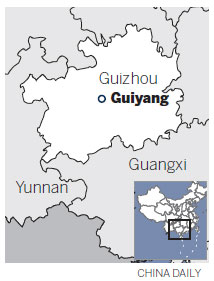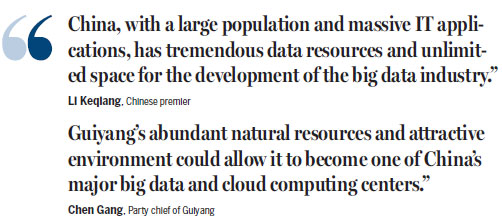

Provincial capital lays out economic strategy to support a new emerging industry, as Yang Jun and Zhao Kai report.
Guiyang, capital of Southwest China's Guizhou province, is taking a major leap forward in its economic development through its support for the big data industry.
With a favorable climate and natural resources, the city is aiming to become the heart of China's big data technology.
The 2015 Guiyang International Big Data Expo, which opened from May 26 to 29, lured thousands of experts, scholars, entrepreneurs and senior government officials from both China and aboard to discuss the future in big data.
"China, with a large population and massive IT applications, has tremendous data resources and unlimited space for the development of the big data industry," wrote Premier Li Keqiang in his letter of congratulations to the expo.
Earlier this year, Li introduced his "Internet Plus" plan to integrate traditional industries with greater information technology, the big data industry and Internet-powered startups.
While encouraging younger talents to start their careers through innovation, the plan also brings more opportunities for less developed regions in China.
"Guizhou is one of the lowest ranked provincial administrations in terms of GDP per capita," said Chen Gang, Party chief of Guiyang.
But Guiyang's abundant natural resources and attractive environment could allow it to become one of China's major big data and cloud computing centers, he said.
Since 2012, technology giants including Alibaba, Tecent, Foxconn and Hewlett-Packard have launched cooperation plans with the governments of Guiyang and Guizhou.
In 2014, 138 projects were signed at a total value of 66.3 billion yuan ($10.9 billion).
"Aside from attracting big names, we are creating a more friendly environment for startups. This will be a significant reason for the big data sector to stay healthy and competitive here," said Chen.
Statistics indicated that more than 2,000 IT-related companies were established in 2014 at Guiyang, most of them startups.
An emerging city
In June, Guiyang will launch its citywide free Wi-Fi project for its residents - the first time any Chinese city has offered such a service.
In February, the Guiyang traffic administration bureau launched a program called "Data Cages" that records and supervises the city's traffic. It reportedly will make automatic adjustments and send out early warnings if there is heavy traffic or an accident.
"We are trying a new way to explore and manage local information, which is based on mass data, from the big data system cloud platform," said Xu Ping, head of the traffic administration bureau in Guiyang.
In April, the city made further strides in big data by opening the Guiyang Big Data Exchange, the first data-based trading platform in China.
"Big data is like a gold mine, and its exchange is based on cleaning, analysis, modeling and visualization," said Wang Sanshou, CEO of Guiyang Big Data Exchange.
"We recently closed 11 deals. It means the target of making money by data exchange can be achieved."
Contact the writers at [email protected] and [email protected]


|
Industrial experts and government officials announce their primary objectives for the 2015 Guiyang International Big Data Expo, which opened from May 26 to 29 and attracted thousands of scholars, entrepreneurs and senior officials from both China and abroad. Provided to China Daily |
|
Companies from Beijing's high-tech district of Zhongguancun have vowed to team up with firms in Guizhou to develop the province's big data industry. Beijing-based AsiaInfo recently joined hands with Guiyang Big Data Exchange, the first data-based trading platform in China. Wu Weidi / for China Daily |